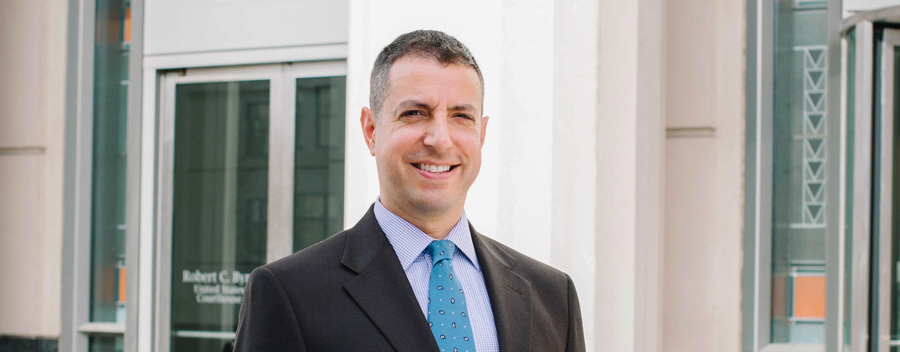
Meet Christian M. Capece ’99, federal public defender for the Southern District of West Virginia
Two years ago, Christian M. Capece ’99 landed his dream job: He was appointed by the Court of Appeals for the Fourth Circuit to serve as the federal public defender for the Southern District of West Virginia. He also holds the rank of lieutenant colonel and serves as a judge advocate in the West Virginia Air National Guard.
Capece says it all started nearly 25 years ago when he saw the movie A Few Good Men. At the time, he was studying to be a teacher at the George Washington University Graduate School of Education. He then decided on an entirely different career path: military law. With his master’s degree in hand, he moved back home to Queens, N.Y., where he started teaching social studies at a parochial school, and enrolled as a part-time student in the evening program at Brooklyn Law School.
Serving as president of the Moot Court Honor Society helped me on a path of leadership."“Going to school at Brooklyn Law, those were some of the best years of my life,” Capece said. “I loved Professor Stacy Caplow’s course on federal criminal defense. Serving as president of the Moot Court Honor Society was also a pivotal experience: It gave me insight into the challenges of leading a group of smart people. It helped me on a path of leadership and it certainly contributed to where I am today.”
Between Capece’s first and second years at the Law School, he joined the Marine Corps and attended officer candidates school in Quantico, Va. After completing his J.D., he spent the next four and a half years serving as a Marine Corps officer and judge advocate. His first assignment was in Okinawa, Japan, where he met his wife, who was a teacher with the U.S. Department of Defense Dependent Schools.
He then clerked for Senior U.S. District Court Judge Thomas C. Platt Jr. in the Eastern District of New York, but was recalled in 2007 to active duty in California to represent a U.S. Marine who was charged with a series of war crimes in Iraq. That same year, he was offered a position as an assistant federal public defender in West Virginia, and he transferred his commission from the U.S. Marines to the Air Force and joined the West Virginia Air National Guard.
Now working as the federal public defender and living in Charleston, W.Va., with his wife and two children, he said: “I’m grateful for this opportunity, and I can’t think of anywhere I’d rather be than where I’m standing right now—in my office.”
Capece also spends one weekend each month at a local Air National Guard base as a judge advocate. He was deployed to Afghanistan in 2012, serving as a team leader in the NATO Rule of Law Field Support Mission.
“Our aim there was to help the Afghan government facilitate the growth of its legal system. Together with lawyers, communicators, engineers, and public affairs folks, we did a range of work, from helping a courthouse get necessary repairs to ensuring that a group of Afghan prosecutors received training in a particular area, such as how to collect fingerprints and provide that evidence in a prosecution against someone suspected of planting an IED. There was no road map. It was unlike anything that had ever been done before, so every day was a challenge—and absolutely fascinating.”
Capece clearly finds his role as the federal public defender equally fascinating. Under his direction, his office, which has 15 staff members, recently launched a monthly podcast series on iTunes, “In Plain Cite,” during which attorneys share their insights about federal criminal law in the Fourth Circuit. Many of his clients have addiction issues, and he is passionate about addressing their challenges, frequently trying to persuade the courts to allow an individual to get access to treatment rather than sit in jail for months awaiting a trial or sentencing.
“Many of our clients have long criminal histories and I can’t tell you how many times I’ve heard someone say, ‘You’re the first attorney who has really listened to me. You’re the first attorney who has spent more than 10 minutes speaking with me.’ Seeing people at their worst moments and being able to humanize them, to treat them with the human dignity that they deserve, that’s the most fulfilling part of this work.”
—by Jen Swetzoff